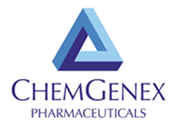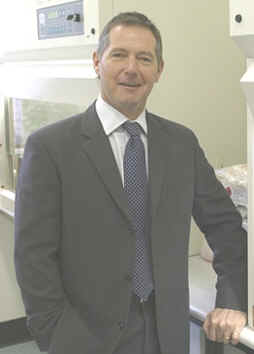ChemGenex Pharmaceuticals Ltd. (CXSP-NASDAQ) and
(ASX-CXS)
Interview with: Greg Collier, Ph.D., CEO and Managing
Director
Business News, Financial News, Stocks, Money & Investment Ideas, CEO Interview
and Information on their understanding of the genetic
basis of diseases such as diabetes, depression, inflammation and
cancer to discover and develop unique personalized medicine solutions to improve patient
outcomes. |
Cover Story
CEOCFO Current Issue
Cover Story Archives
Private Equity Review
CEOCFO Interview Index
Future Features
Analyst Interviews
Corporate
Financials
Contact
& Ordering |
This is a printer friendly page!
ChemGenex Pharmaceuticals’ Ceflatonin® is very exciting because in
clinical trials it has shown to be effective in treating myeloid leukemia (CML) patients
that are developing resistance to tyrosine kinase inhibitors such as Gleevec®

Healthcare
Pharmaceuticals
(CXSP-NASDAQ) and (ASX-CXS)
ChemGenex Pharmaceuticals Ltd.
3457 Edison Way, Suite M
Menlo Park, CA 94025
Phone: 650-474-9800

Greg Collier, Ph.D.
CEO and Managing Director
Interview conducted by:
Lynn Fosse, Senior Editor
CEOCFOinterviews.com
October 6, 2005.
BIO:
Dr Greg Collier, Chief Executive Officer & Managing Director, ChemGenex
Pharmaceuticals Limited.
Dr Collier is one of Australia’s leading biotechnology executives, and is credited
with leading the transformation of the former Australian genomics company Autogen into the
integrated international biopharmaceutical company ChemGenex Pharmaceuticals. As CEO of
the company, Dr Collier has overseen the partnering of major research programs, the $14
million acquisition of a private US biotechnology company and listing of the company’s
securities on the NASDAQ exchange. Dr Collier is recognized internationally as a leader
who has guided his company along a value-creating path towards marketed products, and is a
regular invited speaker at international research and biotechnology conferences.
Company Profile:
ChemGenex harnesses its scientific expertise and understanding of the genetic basis of
disease not only to discover novel targets and mechanisms, but to discover and develop
unique personalized medicine solutions to improve patient outcomes. The company was
founded upon a deep understanding of the molecular mechanisms and genetic basis of complex
diseases. ChemGenex has a strong track record in the identification of novel targets
involved in diseases ranging from diabetes and depression through to inflammation and
cancer. Just as we understand that genetic diversity affects physical attributes, it is
clear that our genes also dictate the way our bodies respond to environmental challenges,
diseases and even medicines. This understanding has led to the conclusion that for complex
diseases the “one size fits all” pharmaceutical model has significant
limitations. ChemGenex believes that these limitations can be overcome by
personalized medicine solutions based on an inclusive understanding of genetics from cause
to treatment of disease.
CEOCFO: Dr. Collier,
will you tell us about your vision for the company?
Dr. Collier: “Our vision from the beginning was to build
a fully integrated pharmaceutical company. Since 1997 when we started, we have built the
company through partnering, mergers and acquisitions continually expanding our technology
base and focusing on clinical outcomes. The early vision was to use the genomics skills we
have and the access to unparalleled collections of human DNA databases to take advantage
of individuals’ genetic variability to not only help to discover new targets, but
eventually to use that variability to improve therapeutic outcomes for patients.”
CEOCFO: What is ChemGenex doing today?
Dr. Collier: “We have been able to build on that base
and concentrate on a number of new targets that we have developed in a range of disease
areas from diabetes, obesity, depression and anxiety and oncology. In June of 2004 we
expanded through a merger that brought in clinical and preclinical expertise and now we
have the ability to take our discoveries right through to clinic. In oncology, we have two
late stage clinical programs, in Phase II and III in chronic myeloid leukemia and a range
of solid tumors. In some of the clinical programs, we are taking advantage of genetic
variability to improve treatment. Our drug Quinamed®, is metabolized by the
NAT2 enzyme in the body. The rate of metabolism of the drug has implications on side
effects and using genotyping we have been able to stratify patients as slow or fast
metabolizers of the drug, and tailor drug dosing to minimize the side effects and maximize
clinical outcomes. This is a classic example of how personalized medicine can be used to
improve treatment. We are in stage II development now at the Sarah Cannon Cancer Center in
Tennessee.”
CEOCFO: Is there much
work done in the genetic variability area?
Dr. Collier: “It is quite well accepted that this whole
era of personalized medicine is showing the way to the future. Most pharmaceutical
companies recognize this, most opinion leaders recognize this, and there is an enormous
amount of work done to see how we can harness the genetic variability to improve patient
outcomes. The problem is that there are not very many examples in the clinic yet. It is a
complex issue and it will be some time before the real benefits of personalized medicine
are realized. Our program with Quinamed® and prostate cancer is one of the
very few examples that are actually in the clinic using the generic variability as a way
to improve therapeutic outcome.”
CEOCFO: How have you decided on which areas to focus?
Dr. Collier: “Our focus has always been the underlying
genetic basis of disease progression and treatment. Originally, this focus was manifest in
our strong target discovery programs in diabetes, obesity and depression. These programs
are ongoing and have produced several targets, which have been licensed to pharmaceutical
companies for further development. As we expanded our operations towards the clinic it
became increasingly clear that cancer was the disease in which we could make the most
progress, and assist the most patients in the short term. So it has been a logical
evolution for us to move into the development of personalized anti-cancer medicines that
reflect the underlying genetic complexities.”
CEOCFO: What is
happening with your Ceflatonin®?
Dr. Collier: “Ceflatonin® is very exciting,
because it is highly effective in treating myeloid leukemia (CML). Recent clinical data
shows that treatment with Ceflatonin® not only halted, but reversed disease progression
in some CML patients from accelerated phase back to chronic phase. Gleevec®,
the current first-line treatment of CML can result in genetic mutations causing resistance
and disease progression in a significant proportion of CML patients and our clinical data
suggests that Ceflatonin® may offer new hope to such patients. We are
delighted to have world opinion leaders such as Dr Hagop Kantarjian from the M.D. Anderson
Cancer Center in Houston working with us in the clinical development, and are hopeful that
we will be able to move quickly into registration trials.”
CEOCFO: Will you tell us
about the financial picture of the company?
Dr. Collier: “We are in a strong position. We have a
strong record of establishing and maintaining alliances with pharmaceutical industry
partners to share the costs and risk associated with early stage disease target discovery
and validation programs. Our discovery R&D costs are largely offset by these
partnerships that still offer us excellent royalty opportunities. On the clinical front we
have brought on some key consultants to help us develop our clinical management team. We
think we have done this effectively and without spending too much money. At present levels
we have enough cash to last until late 2006, which should see us achieve major milestones
in our later stage clinical programs.”
CEOCFO: You are listed
on NASDAQ now; how does that change the company?
Dr. Collier: “We started as an Australian company and by
expanding into the NASDAQ small-cap market we have reached the largest biotechnology
market in the world. The exposure in the U.S. opens the opportunities to access U.S.
capital and to look at other opportunities throughout the U.S., so this was a significant
step in the development of the company into a global biotechnology company.”
CEOCFO: In closing, why
should potential investors be interested?
Dr. Collier: “ChemGenex is a balanced investment
opportunity with two late stage clinical candidates in major markets, a strong R&D
base that has been developed through alliances with pharmaceutical industry partners, and
an experienced and passionate management team. The coming six months should see us reach a
number of major milestones including the completion of phase 2 trials and several other
exciting opportunities. We also have a third anti-cancer compound that will be ready to go
in the clinic at the end of 2006. Adding to that, our listing on the NASDAQ and a
significant R&D platform that is being accessed by pharmaceutical companies around the
world really puts us in a strong position not only for short-term growth, but also for
long-term growth.”
disclaimers
Any reproduction or further distribution of this
article without the express written consent of CEOCFOinterviews.com is prohibited.
|


